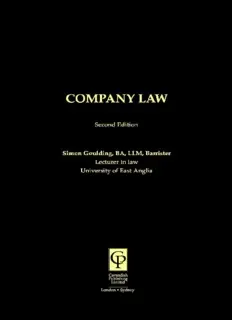
Company Law PDF
Preview Company Law
COMPANY LAW Second Edition CC PP CCaavveennddiisshh PPuubblliisshhiinngg LLiimmiitteedd London • Sydney COMPANY LAW Second Edition Simon Goulding, BA, LLM, Barrister Lecturer in law University of East Anglia C P Cavendish Publishing Limited London • Sydney First published in Great Britain 1996 by Cavendish Publishing Limited The Glass House, Wharton Street, London WC1X 9PX, United Kingdom. Telephone: +44 (0) 171 278 8000 Facsimile: +44 (0) 171 278 8080 e-mail: [email protected] Visit our Home Page on http://www.cavendishpublishing.com © Goulding, S 1999 First edition 1996 Second edition 1999 All rights reserved. No part of this publication may be reproduced, stored in a retrieval system, or transmitted, in any form or by any means, electronic, mechanical, photocopying, recording, scanning or otherwise, except under the terms of the Copyright Designs and Patents Act 1988 or under the terms of a licence issued by the Copyright Licensing Agency, 90 Tottenham Court Road, London W1P 9HE, UK, without the permission in writing of the publisher. Goulding, Simon Company Law. – 2nd ed. 1. Corporation Law – England 2. Corporation Law – Wales I. Title 346.4'2'066 ISBN 1 85941 426 5 Printed and bound in Great Britain For Oliver PREFACE It is well recognised that company law is a large and complex subject which has expanded rapidly in volume in recent years. Added to this is the continual reform to the existing law. This is partly due to the need to comply with obligations imposed on the United Kingdom from Brussels, but partly because of the increasing complexity of commercial life generally. There is no sign that the growth and reform is at an end. In addition, there are now two established series of specialist company law reports (Butterworths Company Law Casesand British Company Cases) which have obviously resulted in many more cases reaching the public domain for comment and analysis. Further, no work on Company Law can now ignore the extra-legal controls and influences on director’s conduct contained in the recent reports on corporate governance nor the proposals for reform put forward, in particular, by the Law Commission. This edition deals with the main features of both the Law Commission’s Report on Shareholder Remedies and the Law Commission’s Consultation Paper on the reform of director’s duties. This all places enormous pressure on any undergraduate course which bears the general title of company law, especially if it is accompanied by the increasing time constraints placed on undergraduate law courses with the move towards modular degrees. To a certain extent, some topics, such as securities regulation and insolvency, can be isolated and treated separately but there is a considerable, interrelated core to company law which simply has to be covered. From the point of view of the student, some kind of perspective needs to be maintained of the subject as a whole so that this core can be understood and applied. I have attempted in this book to present the core principles of company law in a readable and intelligible form, focussing particularly on important cases and extracting key passages of judgment. This is to acknowledge that, despite being a statute based subject, like any subject in a common law jurisdiction, the law ‘lives in’ the cases. Further, a more immediate pragmatic reason for doing so for most of the readers of this book is that examination questions tend to focus on issues which have received judicial attention. I have been ably assisted by Jennifer James of the University of Reading, who has written the chapter on company charges, an area where the law has experienced considerable changes in the last few years. Overall responsibility for the accuracy of the book, however, remains mine. I would like to express my gratitude to all at Cavendish who have worked on the book. I have attempted to state the law as at 1 March 1999. References to the 1985 Act and the 1989 Act throughout the book are to the Companies Act 1985 and the Companies Act 1989 respectively. Simon Goulding Norwich March 1999 vii CONTENTS Preface vii Table of Cases xv Table of Statutes xxxvii Table of Statutory Instruments xlv Table of European Legislation xlvii 1 Introduction 1 GENERAL 1 PUBLIC AND PRIVATE COMPANIES 2 COMPANIES AND PARTNERSHIPS 5 FEATURES OF THE REGISTERED COMPANY 5 Incorporation by registration 5 Transferable shares 8 Limited liability 9 Disclosure and formality 11 The advantages of forming a company 13 The purpose of company law 15 The sources and reform of company law 16 2 Formation and Promotion 27 FORMATION 27 Company names 29 Promoters 32 PROTECTION OF SUBSCRIBERS AND ALLOTTEES OF SHARES 38 Civil liability 38 Criminal liability 46 PRE-INCORPORATION CONTRACTS 47 3 Corporate Personality and the Registered Company 53 THE REGISTERED COMPANY AS A SEPARATE PERSON 53 CORPORATE LIABILITY 56 Identification theory 56 Corporate criminal liability 58 Lennard’s Carrying Co re-appraised: the attribution theory 61 LIFTING THE VEIL OF INCORPORATION 66 Judicial lifting the veil 66 Statutory lifting the veil 79 Miscellaneous legislative provisions 88 4 The Constitution of the Registered Company 91 THE MEMORANDUM OF ASSOCIATION 91 THE ARTICLES OF ASSOCIATION 94 The contractual effect of the articles 94 ix
